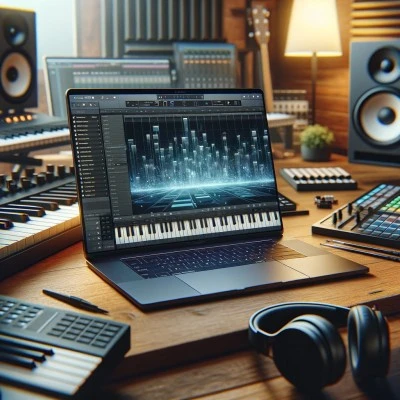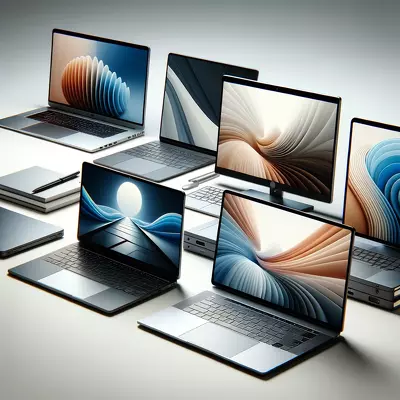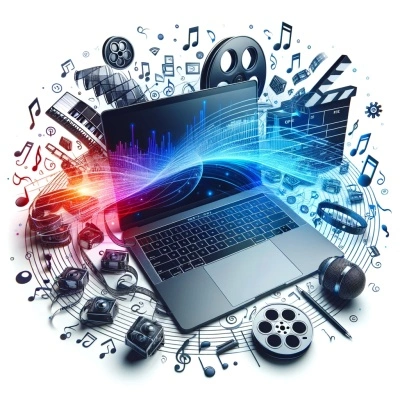Harmonizing Tech with Talent: Discovering the Best Laptops for Recording Music
Selecting the ideal laptop for music production involves considering various critical factors. Performance, storage, and audio capabilities are paramount. High processing power ensures the smooth running of demanding audio software, while ample storage accommodates large files. Superior audio interfaces and sound cards are essential for high-quality sound recording and production. This guide focuses on identifying laptops that excel in these areas, catering to both professional and aspiring musicians.
I. Introduction
A. Importance of Choosing the Right Laptop for Music Production
In the realm of music production, the choice of a laptop can profoundly influence the quality and efficiency of the creative process. Modern music production demands a machine that can handle complex digital audio workstations (DAWs), large audio files, and multiple plugins without faltering. The right laptop serves as the backbone of a musician’s digital studio, ensuring that creativity flows unhindered by technical limitations.
B. Key Factors in Selecting a Laptop for Recording Music
Selecting a laptop for recording music is about more than just picking the most expensive model. It’s about understanding the specific requirements of music production. This includes assessing processor speed, memory, storage, compatibility with audio interfaces, and the practicality of its size and battery life. These factors determine how well a laptop can handle music production tasks ranging from recording and editing to mixing and mastering.
II. Essential Features for Music Production Laptops
A. Processor Speed and Performance
The heart of a good music production laptop is its processor. A high-speed, multi-core processor is essential for smooth operation, especially when dealing with multiple tracks and real-time audio processing. It determines how efficiently your software runs and how well it handles plugins and virtual instruments.
B. Memory and Storage Options
RAM (Random Access Memory) is crucial for multitasking and running heavy music production software. A minimum of 8GB RAM is recommended, but 16GB or more is ideal for professional work. Regarding storage, a solid-state drive (SSD) offers faster data access than a traditional hard disk drive (HDD), which is beneficial for quickly loading samples and software.
C. Audio Interface Compatibility
A laptop’s compatibility with various audio interfaces is vital. A good laptop should have sufficient USB or Thunderbolt ports to connect external audio interfaces, MIDI controllers, and other peripherals. The quality of the laptop’s sound card is also a consideration, although most producers will prefer to use external audio interfaces for better sound quality.
D. Battery Life and Portability
For musicians on the go, battery life and portability are key. A laptop that offers a balance between performance and battery life is ideal. Lighter laptops are more portable but should maintain the necessary features and durability.
III. Top Laptops for Recording Music
A. Dell XPS 13 9360: A Beginner’s Choice
The Dell XPS 13 9360 is a solid entry-level choice for those starting in music production. It’s equipped with a high-speed processor and offers a range of connectivity options, making it versatile for various music production needs. Its compact size enhances portability. Although it has limitations in RAM upgradeability and may need to be more powerful for producers working with sample-heavy music, it provides adequate specifications for most DAWs.
B. Razer Blade Stealth 13: The Best Ultrabook for Music Production
The Razer Blade Stealth 13 stands out as an ultrabook. Powered by an 8th-generation Intel Core i7 processor, it can turbo boost up to 4.6 GHz, which is beneficial for intensive music production tasks. With 16GB RAM and an upgradeable 256GB SSD, it provides both speed and storage. Its 4K resolution QHD+ touch display and sleek design make it not only a powerful machine for music production but also a visually appealing one. The Razer Blade Stealth 13 is a top choice for professionals who require a robust laptop for multi-tasking without lag.
C. HP Jaguar 15.6 Touchscreen: Best Budget Option
For those looking for an affordable yet capable music production laptop, the HP Jaguar 15.6 Touchscreen is a standout choice. It features a 2.50GHz Intel Core i5 processor with Turbo Boost up to 3.10GHz, 8GB RAM, and a 1TB HDD, which is ample for various production tasks. The touchscreen adds efficiency to the studio, allowing for easier mixing and mastering. While it might have a slower HDD and less battery life compared to others, its upgradability and touchscreen feature makes it a valuable tool for music producers on a budget.
In conclusion, when choosing the best laptop for recording music, it’s crucial to consider each model’s unique strengths and how they align with your specific production needs. Whether you’re a beginner or a professional, there’s a laptop that fits your requirements in the world of music production.
IV. FAQs
Q: What are the minimum system requirements for a laptop used in music production?
A: For music production, a laptop should have at least an Intel Core i5 processor (or equivalent), 8GB of RAM, and a 256GB SSD. Higher specifications, such as an i7 processor, 16GB RAM, or larger SSDs, offer better performance for more intensive tasks.
Q: How important is the sound card in a music production laptop?
A: While a good internal sound card is beneficial, most professional producers use external audio interfaces for superior sound quality and lower latency. The laptop’s sound card is more relevant for casual use or basic recordings.
Q: Can gaming laptops be used for music production?
A: Yes, gaming laptops are often well-suited for music production. They have powerful processors, ample RAM, and good graphics capabilities, which can be beneficial for some music production software.
Q: What makes SSD preferable to HDD in music production laptops?
A: SSDs offer faster data access speeds than HDDs, leading to quicker boot times, faster software loading, and more efficient handling of large audio files and samples.
Q: How does battery life impact a music production laptop?
A: Good battery life is important for portability and convenience, especially for musicians who travel or work in different locations. However, battery life may be less critical for studio use.
Q: Are Macs better than Windows laptops for music production?
A: Both Mac and Windows laptops can be effective for music production. The choice often comes down to personal preference, software requirements, and budget.
Q: Can laptops for music production also handle video editing and graphic design?
A: Laptops with high processing power, good graphics capabilities, and ample RAM, like the Razer Blade Stealth 13, can handle video editing and graphic design tasks.
Q: What are the best laptops for blogging and lightweight tasks?
A: For blogging and lightweight tasks, laptops like the Dell XPS 13 or HP Jaguar 15.6 Touchscreen are suitable, offering good performance, portability, and battery life.
V. Conclusion
A. Best Offer
The Razer Blade Stealth 13 emerges as the best laptop for recording music, balancing powerful performance, high-quality display, and sleek design. Its advanced processor and ample RAM make it ideal for professional music production.
B. The Alternative
For those seeking a more budget-friendly option, the HP Jaguar 15.6 Touchscreen is an excellent alternative. It provides sufficient power for most music production tasks and offers great value for its price.
VI. Suggested Readings
Before embarking on a journey in music production, it’s beneficial to deepen your knowledge with some insightful literature. The following books offer valuable information ranging from technical skills to creative insights in music production.
- “Step By Step Mixing: How to Create Great Mixes Using Only 5 Plug-ins” – A practical guide to achieving professional-sounding mixes with minimal equipment.
- “Hal Leonard Recording Method Book 6: Mixing & Mastering” – Part of a comprehensive series, this book covers the essential aspects of mixing and mastering.
- “The Art of Mixing” – A visual guide that clarifies fundamental mixing concepts, ideal for visual learners.
- “Modern Recording Techniques” – A reference book offering insights into the practice and theory of audio recording.
- “Music Theory for Computer Musicians” – Tailored for the modern producer, this book dives into music theory aspects relevant to digital audio workstations.
Reading these books can provide a solid foundation in the technical and creative aspects of music production. Whether you are a beginner or an experienced producer, these resources can enhance your skills and understanding of the music production process.






